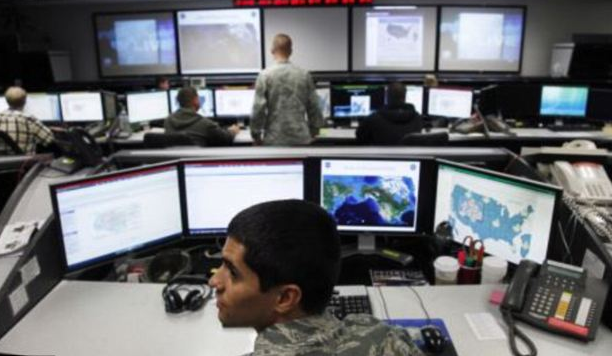By Matt Blake
It was revealed this month that the Pentagon had ordered staff at its top-secret missile defence unit to stop watching porn on U.S. government computers.
But rather than the porn-cruising culprits at the Missile Defence Agency coming under fire for the massive security breach, President Barack Obama is getting the blame.
In an article for The Washington Times, Lori Handrahan linked the agency’s porn habits with the Secret Service’s Columbia prostitute scandal before relating both to a problem with Obama’s leadership.
‘The Colombia scandal was the president’s wake-up call. The White House needed to order an in-depth and urgent investigation into porn, child porn and prostitution in all government agencies. Mr. Obama did no such thing.
‘Now America’s Missile Defense Agency may be exposing the core of our national security,’ Handrahan, a professor at American University's School of International Service, wrote on Friday.
The article traces the government’s ‘porn problem’ back to 2006 when a deputy press secretary for the Department of Homeland Security was arrested for trying to seduce someone he thought was a teenage girl online.
The piece then highlights a 2010 report by the Securities and Exchange Commission which found that 17 of 31 employees caught accessing porn at work since 2008 were senior staff. Handrahan also recalls 2010’s revelations that Pentagon staff were accessing child porn.
‘America’s most professional security officials […] seem eager to discredit themselves. Russians must be celebrating. During the Cold War, they had to train and deploy real female agents. Today, Americans come freely to honey pots directly from the Pentagon’s missile-defence system,’ he writes.
The recent violation at the Missile Defence Agency came to light after fears were raised that viruses may have already been smuggled into the department's mainframe through x-rated sites.
An internal probe then found that some staff had been downloading adult material on office computers and sharing them with each other via the internal network.
It constitutes a massive security risk to one of America's most secretive agencies because porn sites provide perfect cover for criminals and foreign spies to sneak snooping software past even the most sophisticated of firewalls.
In a bid to curb the abuse, the agency's executive director sent a stern memo warning staff that 'appropriate disciplinary action' would be dished out to anyone caught surfing the net for smut.
'There have been instances of employees and contractors accessing websites, or transmitting messages, containing pornographic or sexually explicit images,' John James Jr wrote in the July 27 memo leaked to Bloomberg News.
'These actions are not only unprofessional, they reflect time taken away from designated duties, are in clear violation of federal and DoD and regulations, consume network resources and can compromise the security of the network though the introduction of malware or malicious code, he wrote.'
He added that anyone caught misusing the agency's network will face losing their security clearance and could be suspended, even fired.
Agency spokesman Rick Lehner told Bloomberg that the memo was written after 'a few people' downloaded material 'from some websites that were known to have had virus and malware issues'.
One government cybersecurity expert, who wished to remain anonymous, said criminal gangs and foreign intelligence agencies, such as Russia, embed spyware deep within the coding of pornographic websites in a bid to access and harvest confidential data from governments and corporations.
Such sites contain high-quality images and videos that contain complex computer coding - the ideal place to hide viruses.
The Missile Defense Agency is responsible for developing, fielding and upgrading the nation’s ground- and sea-based missile defense programs.
It works closely with countries including Japan and Israel as well as companies such as Boeing Co. and Lockheed Martin Corp.
In July last year, America vowed to retaliate with military force against countries that sabotage its computers in the Pentagon’s first ever strategy on how to fight escalating cyber attacks.
Anxious to contend with growing internet incursions linked to Russia and China, U.S. military chiefs reportedly agreed that the most serious sabotage attempts should constitute an act of war.
The document was designed to tackle a changing world in which computer hackers could cripple America’s financial markets or public transport systems.
